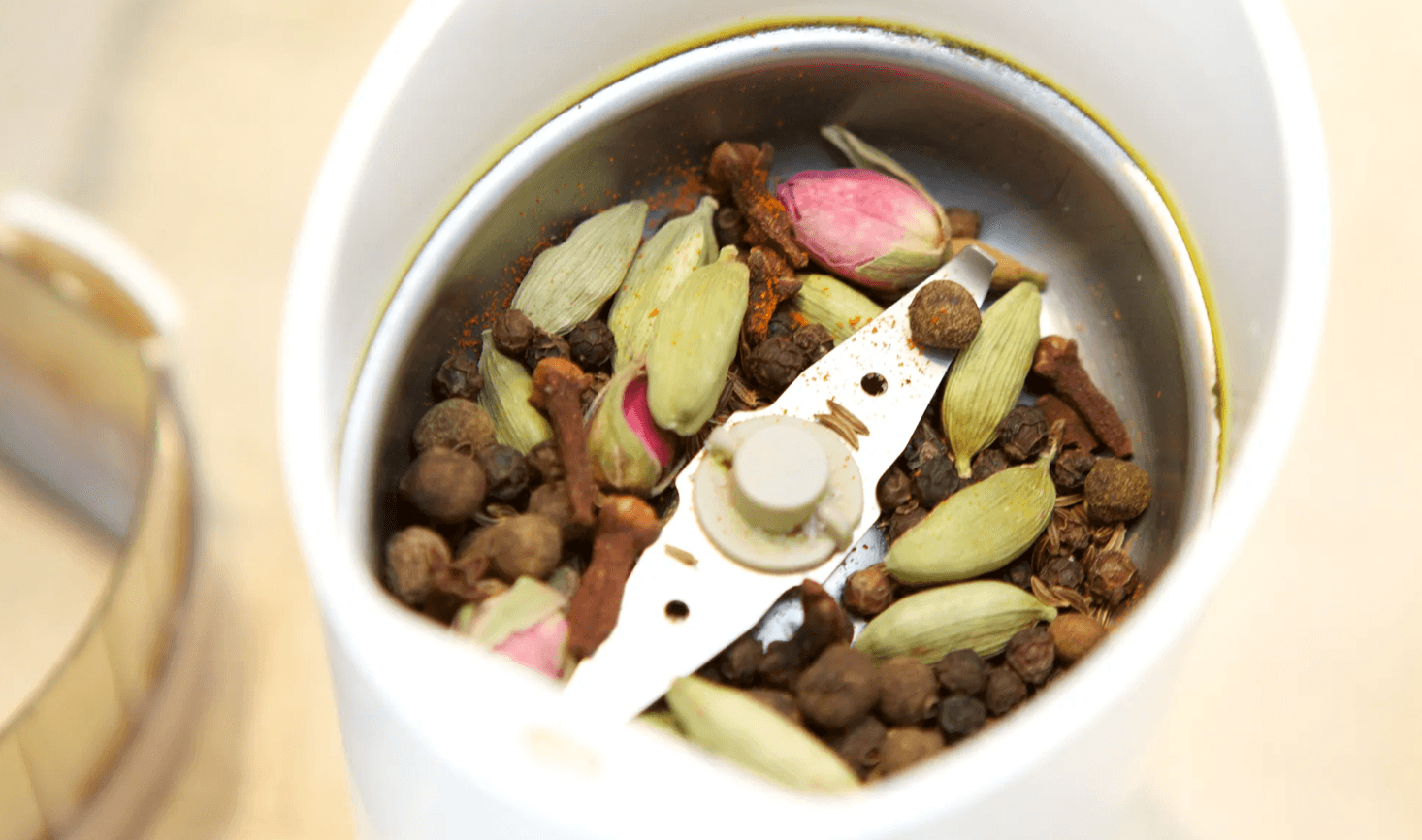Yes, you can use a coffee grinder for spices, but it’s crucial to consider the potential for flavor transfer. Grinding spices in a coffee grinder can leave lingering aromas and tastes that impact your coffee or future spice blends. This article explores the pros and cons of using a coffee grinder as a spice grinder alternative, methods for cleaning, and ways to minimize cross-contamination.

Image Source: www.coffeehit.co.uk
The Allure of Using a Coffee Grinder for Spices
Most people have a coffee grinder in their kitchen but don’t own one just for spices. Because of that, using your coffee grinder for both seems like a great way to save money and space on the counter. Why is this such a popular idea?
Convenience and Cost-Effectiveness
Using one appliance for multiple tasks is convenient. It saves counter space and the expense of buying another kitchen gadget. If you only occasionally grind spices, using your coffee grinder can seem like a smart choice.
Speed and Efficiency
Coffee grinders, especially burr grinders, are designed to quickly and efficiently grind beans. This speed and efficiency also work well for spices, turning whole spices into powders in seconds.
Can You Grind Peppercorns in a Coffee Grinder? Absolutely!
Yes, peppercorns grind easily in a coffee grinder. This is a common practice. Black pepper is a frequently used spice. Grinding it fresh releases its full flavor.
The Downside: Flavor Transfer Coffee Grinder
The biggest problem is the risk of flavor transfer. Spices have strong oils that can stick to the grinder’s components. This affects the taste of your coffee and subsequent spices ground in the same device.
Lingering Aromas and Tastes
Strong spices like cumin, coriander, and chili powder leave a strong scent and taste. These can contaminate your coffee beans, resulting in a very unpleasant cup of coffee.
Cross Contamination Spices Coffee
If you’re not careful, the residue from grinding spices can mix with your coffee. This leads to unwanted flavors that ruin the taste. The more aromatic spices, the greater the risk of cross-contamination.
The Impact on Coffee Flavor
Coffee has subtle and delicate flavors that can easily be overwhelmed by spices. Even a small amount of spice residue can drastically alter the taste of your coffee.
Dedicated Spice Grinder: Is It Worth It?
A dedicated spice grinder avoids the problem of flavor transfer. It ensures that your coffee remains pure and your spices retain their individual tastes.
The Benefits of a Separate Grinder
A separate grinder eliminates the risk of cross-contamination. It allows you to grind spices without worrying about affecting the flavor of your coffee.
Spice Grinder vs Coffee Grinder: Key Differences
While both types of grinders perform a similar function, spice grinders are often designed with features to handle the unique properties of spices, such as their varied textures and oil content. A coffee grinder is usually specifically optimized for grinding coffee beans to a precise consistency.
Space and Budget Considerations
Buying a dedicated spice grinder requires extra space and money. However, the peace of mind and improved flavor quality are often worth the investment.
Grinding Spices in Coffee Grinder: Minimizing the Risk
If you choose to use your coffee grinder for spices, you can take steps to reduce flavor transfer.
Choosing the Right Coffee Grinder
Blade grinders are easier to clean than burr grinders. If you plan to grind spices, a blade grinder is a better choice because they are less likely to retain flavors.
Using Coffee Grinder for Herbs
Dried herbs are less oily than many spices. So, using a coffee grinder for herbs might be acceptable. But, be sure to clean it thoroughly afterward.
Using Coffee Grinder for Cumin: A Cautionary Tale
Grinding spices like cumin in a coffee grinder is risky. Cumin has a very strong flavor that is hard to remove. Only grind cumin if you’re prepared for its flavor to linger.
Cleaning Coffee Grinder After Spices: Essential Techniques
Proper cleaning is essential to remove spice residue and prevent flavor transfer.
The Rice Method
Grinding plain white rice can help absorb lingering oils and odors.
- Grind a cup of uncooked white rice in the coffee grinder.
- Discard the rice powder.
- Wipe down the grinder with a clean, dry cloth.
The Bread Method
Similar to rice, bread can absorb residual oils and smells.
- Tear a few slices of bread into small pieces.
- Grind the bread in the coffee grinder.
- Discard the bread crumbs and wipe down the grinder.
Disassembling and Cleaning
For a deeper clean, disassemble the grinder as much as possible.
- Unplug the grinder.
- Remove any detachable parts, such as the grinding chamber and blades.
- Wash these parts with warm, soapy water.
- Rinse thoroughly and allow to dry completely before reassembling.
Using Baking Soda
Baking soda is a natural deodorizer that can help eliminate lingering odors.
- Make a paste of baking soda and water.
- Apply the paste to the inside of the grinder.
- Let it sit for a few hours.
- Wipe away the paste and rinse thoroughly.
Coffee Grinder Cleaning Tablets or Powders
Some products are made to clean coffee grinders. These can be very effective at removing oils and odors. Follow the instructions on the product label.
Spice Grinder Alternative: Other Options
If you want to avoid using your coffee grinder for spices, consider these alternatives.
Mortar and Pestle
A mortar and pestle is a traditional method for grinding spices. It gives you more control over the texture and releases the spices’ essential oils.
Manual Spice Grinders
Manual spice grinders are small, handheld devices. They are easy to use and clean. They are a good choice for small batches of spices.
Food Processor
A food processor can grind spices. However, it is less precise than a spice grinder. Be sure to clean the food processor thoroughly to avoid flavor transfer.
Weighing the Pros and Cons
Before using your coffee grinder for spices, carefully consider the advantages and disadvantages.
| Feature | Coffee Grinder for Spices | Dedicated Spice Grinder |
|---|---|---|
| Cost | Lower (if you already own a coffee grinder) | Higher (requires purchasing a separate appliance) |
| Convenience | High (one appliance for multiple uses) | Moderate (requires a separate appliance) |
| Flavor Transfer | High risk of cross-contamination | No risk of cross-contamination |
| Cleaning | Requires thorough cleaning to prevent flavor transfer | Easier to clean, as it is only used for spices |
| Performance | May not be optimized for spices | Designed specifically for grinding spices |
Making the Right Decision for You
The best decision depends on your individual needs and priorities. If you value the purity of your coffee flavor and frequently grind spices, a dedicated spice grinder is the better choice. If you only occasionally grind spices and are willing to take the time to clean your coffee grinder thoroughly, using it for spices may be acceptable.
FAQ: Using a Coffee Grinder for Spices
Can I use a coffee grinder for spices?
Yes, you can, but be aware of the risk of flavor transfer and the need for thorough cleaning.
What spices should I avoid grinding in my coffee grinder?
Avoid grinding strong, oily spices like cumin, coriander, chili powder, and turmeric. These spices are more likely to leave lingering flavors and aromas.
How do I clean my coffee grinder after grinding spices?
Use the rice method, bread method, or disassemble and wash the grinder with warm, soapy water. You can also use baking soda or specialized coffee grinder cleaning products.
Is a blade grinder or a burr grinder better for grinding spices?
A blade grinder is generally better because it’s easier to clean. Burr grinders have more nooks and crannies that can trap spice residue.
Will grinding rice completely remove spice odors from my coffee grinder?
Grinding rice can help, but it may not completely remove all odors. Multiple cleaning steps may be needed for strong spices.
Can I use a coffee grinder for herbs?
Yes, you can use a coffee grinder for herbs, but be sure to clean it thoroughly afterward.
Does grinding spices in a coffee grinder void the warranty?
Check your coffee grinder’s manual. Some manufacturers may void the warranty if the grinder is used for purposes other than grinding coffee beans.
Can I use a wet cloth to clean my coffee grinder?
Never submerge the motor unit of the coffee grinder in water. Use a slightly damp cloth to wipe the exterior, but avoid getting any liquid inside the machine.
What’s the best way to store my spices after grinding?
Store ground spices in airtight containers away from heat, light, and moisture. This will help them retain their flavor and aroma.

Hi, I’m Larry Fish, the mind behind MyGrinderGuide.com.. With a passion for all things kitchen appliances, I created this blog to share my hands-on experience and expert knowledge. Whether it’s helping you choose the right tools for your culinary adventures or offering tips to make your kitchen more efficient, I’m here to guide you. My goal is to make your time in the kitchen not only easier but also enjoyable! Welcome to my world of kitchen mastery!
